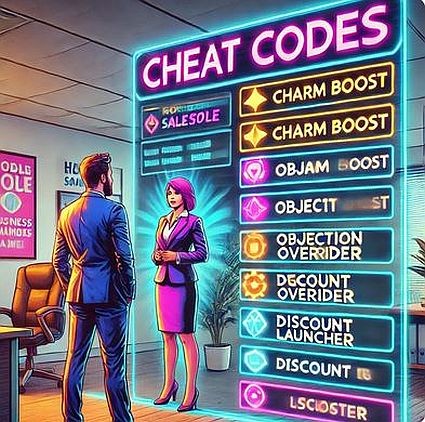Every morning while I’m having my first coffee, I take a quick look at LinkedIn. I limit myself to 3 swipes on my IPhone. There are two dominant classes of content (discounting the increasing ads). The first is “My story….” These are either, “Here are the hardships I overcame….” or “I’ve made millions of dollars each year….” The other category are the “Cheat codes.”
Cheat codes are presented by “experts,” claiming they have discovered the secrets to success, and they present those secrets as “cheat codes.” They cover everything you possibly could want. The secrets to cold emails, how to build your LI network, how to post content that gets 1000s of likes, high impact telephone calls, ChatGPT prompts that do 90% of your job, qualifying questions, objection handling, closing, GTM strategies.
Anything imaginable, and some you can’t is sitting in your feed! All from experts who have earned millions using the same techniques. Most are available for free, some you have to sign up for a newsletter.
But leveraging these cheat codes take all the hard work away from you. Just follow the instructions and you too can make millions. And, based on the likes or “DM me for a copy,” 100s to 1000s of others are using the exact same cheat codes.
To be honest, some of them are quite useful—just a small number. They are useful, not because they take away the work from me, but they cause me to think about something a little differently. I never end up using the cheat code, but I go into an exploration of new ideas and approaches.
But as I talk to others, I find most people are using these differently. They don’t want to do the work thinking about a conversation that might be relevant and engaging for their customers or people. They just want a script or formula they can apply blindly. And if the cheat codes they try today don’t work, they know tomorrow, their feeds will be filled with more hints, tips, tricks, scripts, and prompts they apply mindlessly.
Now, I’m really not bashing the creators of these cheat codes. Sure some of them just copy them or have ChatGPT generate them–but at least they are using interesting prompts to generate them. Most of these cheat codes were the result of hard work on the part of the author in figuring out the things that drove their success. And they are sharing those secrets (please sign up for my newsletter or class) to others.
The people I’m really bashing are those who just apply them blindly. They don’t take the time to do the work. They don’t take the time to understand them. They don’t even think about how they might adapt and modify them for their unique situations. They just take the cheat codes, apply them with no understanding, then are confused with why they didn’t work. They are the ones that fundamentally don’t care and are going through the motions. They think, “I was supposed to make a million dollars with this cheat code, and I won’t even make my OTE!”
I have a challenge to those people, if you are up to it.
Take the time to look at your role, what it takes to be successful, and build your own cheat codes. It can be on anything, prospecting, qualifying, researching/prepping for a call, doing demos. Or as a leader, the cheat codes you use in driving the performance of your people.
Send them to me, and, for those that are taking the challenge seriously, rather than those that are gaslighting me, we’ll get on a podcast and talk about your cheat codes and how you have applied them to get success. We’ll publish them, giving you full attribution, and you can collect the names or get them to sign up for your offerings. I’ll get friends to promote them on their podcasts and blogs.
But the real payoff to those who take me up on the offer, is they are taking the time to do the work, to figure things out, to adapt to changes in their customers and people. And the people that do that, consistently are the very highest performers, year after year!
Game on!
Afterword: Here is the AI generated discussion of this post. As often happens, it’s much better than the article. Enjoy!

Leave a Reply